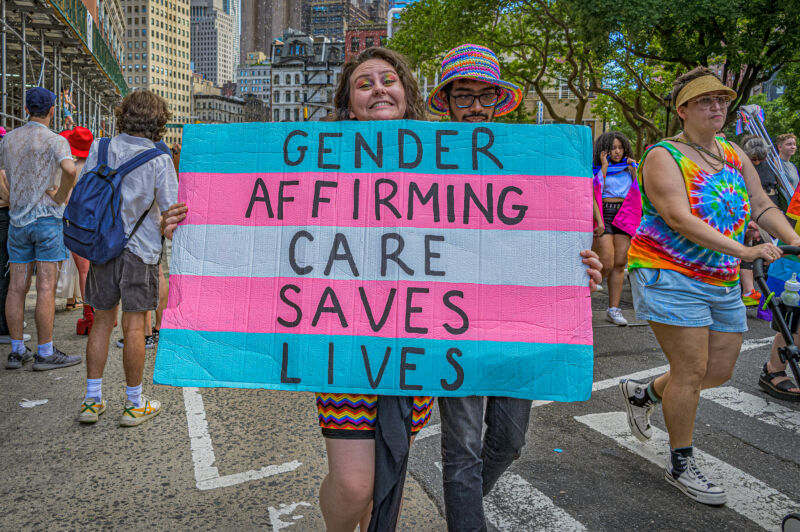
People who underwent gender-affirming chest reconstruction surgeries as adults have virtually no regrets years later and overwhelmingly high levels of satisfaction with their decision to have the procedure, according to a study published Wednesday in JAMA Surgery.
The results were so clear, in fact, that the study authors were unable to perform the complex statistical analyses they had planned due to the striking uniformity in the survey responses.
Overall, this study on adults adds to a limited, but growing body of data suggesting that gender-affirming care is “essential” and potentially life-saving care that comes with significant benefits for people who are transgender and gender diverse. Collectively, this is why major medical organizations—including the American Medical Association, the American Academy of Pediatrics, the American Psychological Association, and the Endocrine Society—advocate for protecting access to evidence-based gender-affirming care, which is a broad, sometimes misconstrued, term.
To American medical experts, gender-affirming care is not a set protocol or step-wise plan, but a flexible approach to tailored, patient-led care that can include treatments—such as counseling, hormone replacement therapy, and surgical procedures—that aim to support and foster the autonomy of each individual.
Recently, gender-affirming care has drawn significant scrutiny, particularly care for youth. This month, the American Academy of Pediatrics (AAP) called for a systemic review of evidence to develop updated guidance for pediatricians, a move it said “reflects the [AAP] board’s concerns about restrictions to access to health care with bans on gender-affirming care in more than 20 states.” There have also been restrictions and calls for more research in some European countries, including Norway, Finland, Sweden, and England. In the meantime, while researchers collect more data, the AAP reaffirmed its support of gender-affirming care and highlighted that it “opposes any laws or regulations that discriminate against transgender and gender-diverse individuals, or that interfere in the doctor-patient relationship.”
For the experts involved in those relationships, the benefits appear clear in their clinics and medical offices. But definitive data has been difficult to amass so far, owing to the limited research and the small patient population. Even now, amid rising awareness and support of transgender and gender-diverse identities, only a sliver of the US population—an estimated 1.6 percent of adults—identify as transgender or nonbinary. As such, many studies to date have involved small sample sizes, have lacked validated instruments to assess condition-specific outcomes, and have had short follow-up times.
Longer-term outcomes
The new study in JAMA Surgery aimed to address some of those limitations. It used validated survey tools to assess both decision regret and satisfaction, and it looked at decision outcomes at least two years but up to 23 years after individuals underwent chest masculinization surgery. The study’s sample size was still small, though, with a total of 235 eligible patients identified.
The study was led by Megan Lane, a surgeon at the University of Michigan who specializes in gender-affirming procedures. Lane and her colleagues tapped into medical records of patients at the University of Michigan, which they noted is the oldest continually operating gender-affirming surgical unit at a US academic center, and to which patients from other care providers are referred. The researchers looked for patients who underwent chest masculinization surgeries between 1990 and 2020.
Lane and her co-authors reached out to the 235 eligible patients to have them take a survey of their outcomes. Of the 235, 139 responded to the survey, though the researchers still had some medical information about 96 non-responders based on their records.
Of the total 235 patients, none requested or underwent a reversal treatment, and about a quarter of responders and non-responders went on to have additional gender-affirming procedures after their chest reconstruction surgeries. Their ages at the time of the procedure ranged from 23 to 33, with the median age of the responders being 27.1 and 26.4 for the non-responders.
The responding 139 patients rated their satisfaction with the procedure using a “revised Holmes-Rovner Satisfaction With Decision” scale, an established tool that involves rating four statements on a five-point Likert scale, with a score of five indicating the most satisfied. The median score from the respondents was five (mean 4.8 out of a possible five).
They also rated regret with the established “Decision Regret Scale,” which involves rating five items on a five-point Likert scale, with the total then getting converted to a 100-point score. In that final scale, the lower the score, the lower the regret, with 100 being maximum regret. The respondents’ median score was 0 (mean 4.2 out of a possible 100).
Surprising uniformity
At the time of the survey, 88 of the 139 (63 percent) identified as male, 17 (12 percent) identified as nonbinary, and 29 (21 percent) identified with multiple gender identities. Overall, 27 of the respondents (19 percent) had different gender identities at the time of their surgery than at the time of the survey, but their regret and satisfaction ratings were not significantly different than those who had concordant identities. “These findings support the notion that ongoing gender exploration should not be used as a proxy measure for regret,” Lane and co-authors wrote.
The researchers had also collected a variety of other clinical and demographic data on the patients, such as information on surgical complications, mental health information, and life partner status. They had planned to use that data in statistical analyses that might identify factors possibly associated with regret or dissatisfaction. But they weren’t able to do those statistical analyses.
“This extremely low level of regret and dissatisfaction and lack of variance in scores impeded the ability to determine meaningful associations among these results, clinical outcomes, and demographic information,” Lane and co-authors wrote in the study.
In comments to MedPage, Lane noted that her team didn’t expect the results. “Based on our prior experience with this patient population, we expected people to be very satisfied with their decision to get surgery, but we were surprised to find how little these results varied,” Lane said.
The authors did note that they had to exclude survey results for 13 respondents because they puzzlingly rated maximal or nearly maximal levels of both satisfaction and regret. The authors speculated that these respondents may have misread the instructions and misunderstood that the scales were reverse scored for the two ratings.
“Double standard”
Nevertheless, the remaining results were “overwhelmingly positive,” particularly compared with regret ratings of other types of treatments, including breast cancer treatment and reconstruction, the researchers noted. In a 2016 review of 44 studies looking at regret after procedures, only one study examining treatment for urinary incontinence had a lower level of decisional regret than the current study on chest reconstruction surgery.
In an accompanying commentary piece by surgeons at Rush University Medical Center in Chicago, Drs. Ian Nolan, Brielle Weinstein, and Loren Schechter also noted the “striking” results compared with the regret rates from other types of medical treatments, saying the finding highlights a “double standard.”
“In gender-affirming surgery, concerns regarding the potential for regret are often used to deny or limit access to medically necessary care,” they wrote. Yet, regret levels from other procedures are often significantly higher. “Interestingly, no legislative efforts are aimed at banning these procedures.” Currently, at least nine states bar adults and children from using Medicaid for gender-affirming care.
Like Lane and co-authors, Nolan, Weinstein, and Schechter note that the low levels of regret experienced after gender-affirming surgical procedures may involve multiple factors distinct from regret of other types of procedures. This could include social regret linked to increased stigma and discrimination after procedures or a loss of social support systems. “Regret regarding one’s identity is rare,” they wrote.
Lane and co-authors called for the development of conditions-specific tools to better understand regret from gender-affirming care in the few cases in which it occurs.
Nolan, Weinstein, and Schechter meanwhile urge that “public health efforts should bolster support systems for at-risk populations, and medical professionals should work to identify vulnerabilities associated with social determinants of health rather than deny medical care over-exaggerated claims regarding the possibility of procedural regret.”








